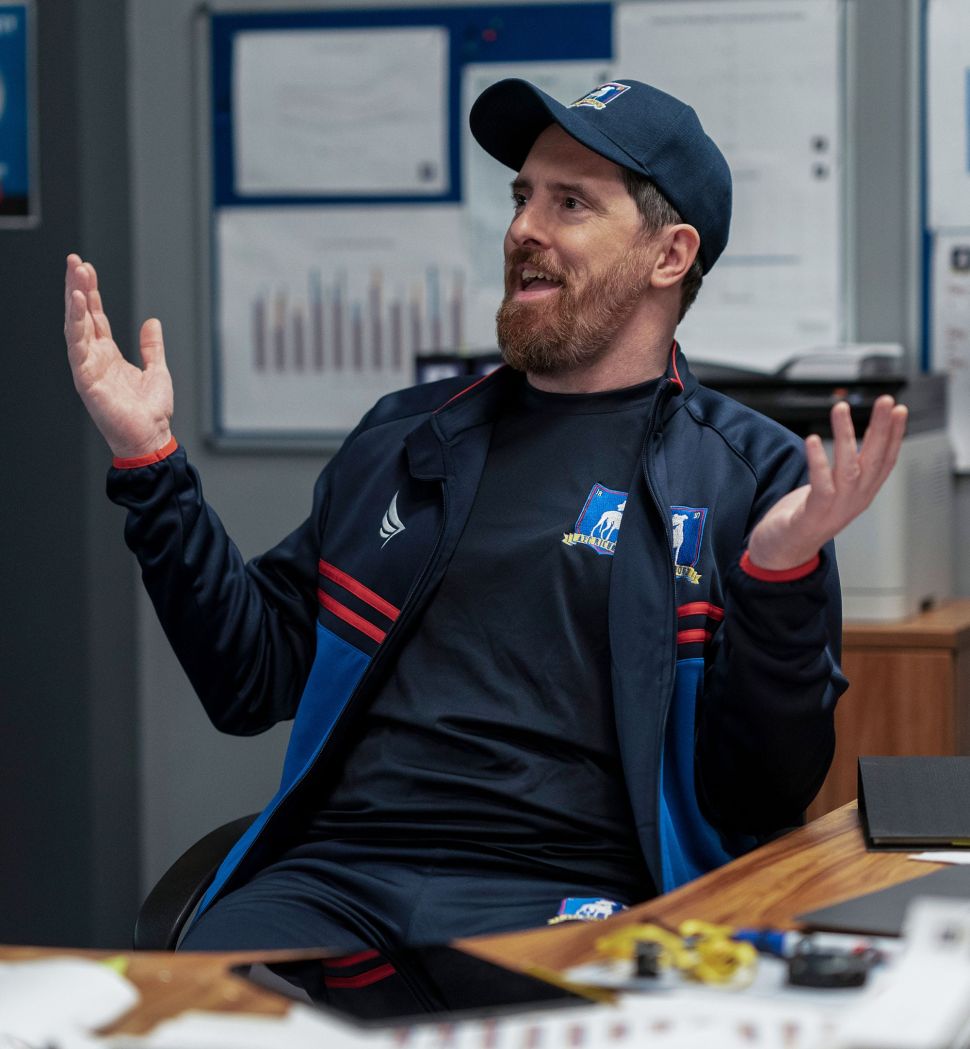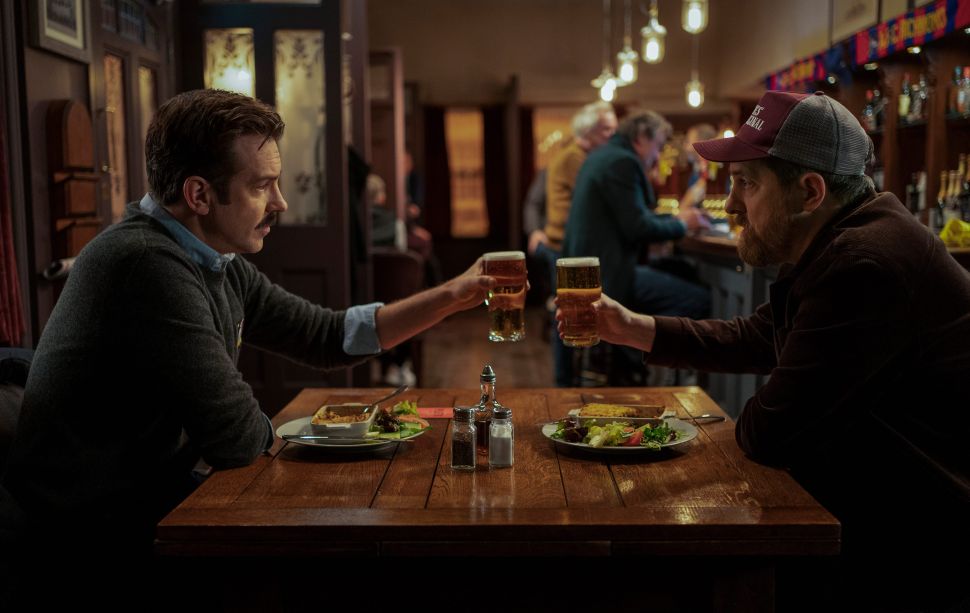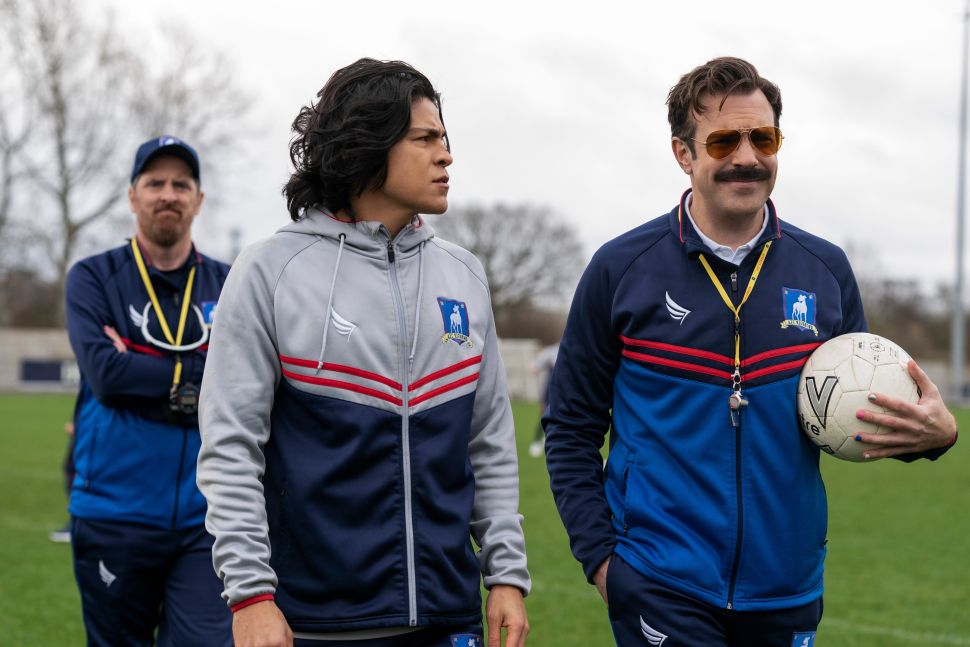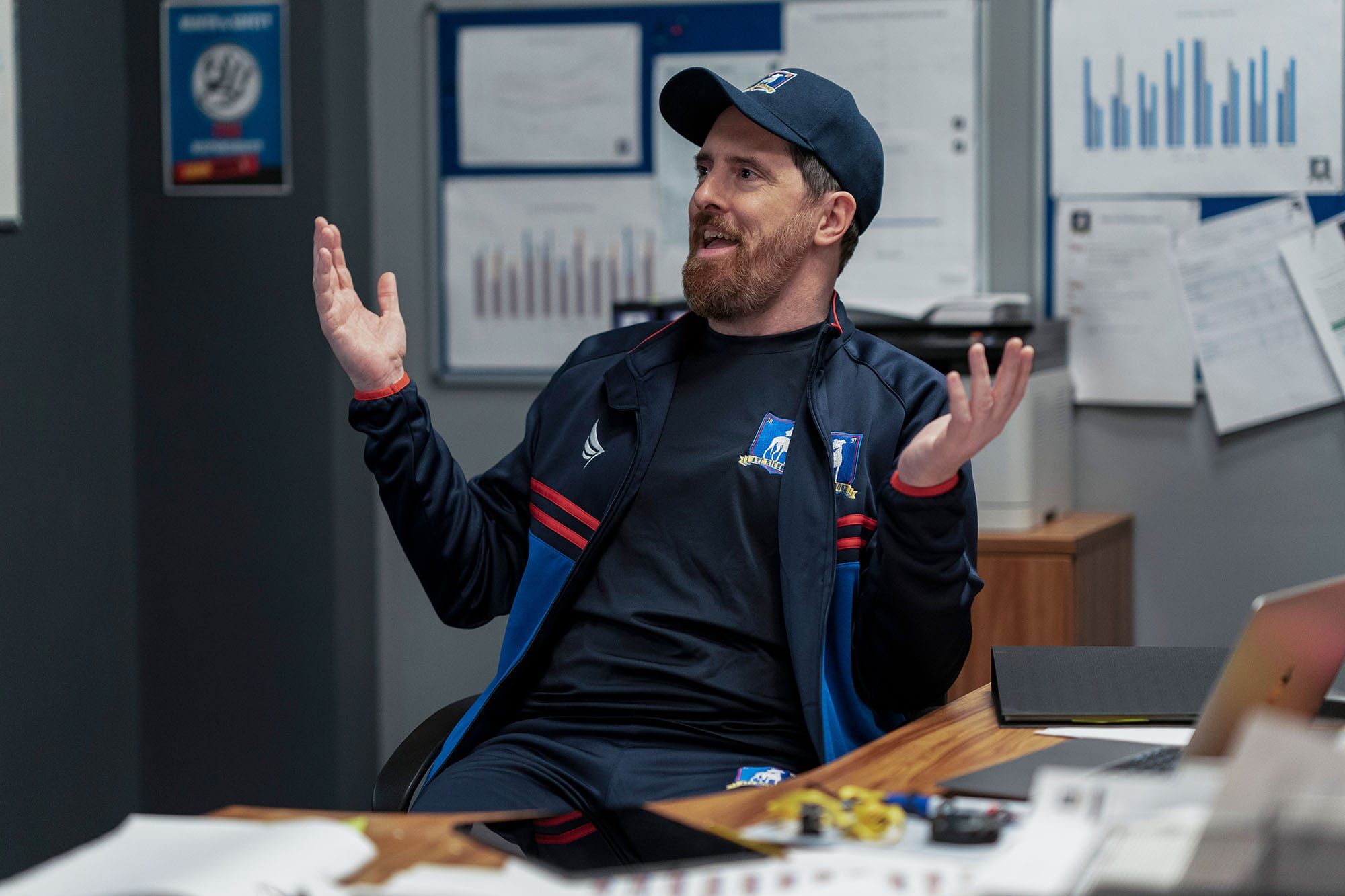
Brendan Hunt stars as Coach Beard in Season 2 of Ted Lasso. Apple TV+
Brendan Hunt sounds skeptical when told that Ted Lasso’s upcoming second season is so good it will bring tears to the viewers’ eyes. “People are just starting to see it, so it’s nice to hear some reactions,†Hunt says, speaking to Observer from Los Angeles. “I’m glad you liked it.â€
Still, he doesn’t sound like he quite realizes the magnitude of the global adoration for the Apple TV+ series, which premieres its second season on July 23. And while Hunt may be best known as Ted Lasso’s monosyllabic Coach Beard, the actor is also one of the series’ co-creators and writers. He and long-time friend Jason Sudeikis created the show together and it’s as much his vision as it is the vision of its star.
The uplifting, hilarious first season earned Hunt three Emmy nominations this year, for Outstanding Supporting Actor in a Comedy Series, as well as two nods for Outstanding Writing for a Comedy Series. The actor, who is more loquacious than his character, can see the impact Ted Lasso has had, but he’s still processing it. When asked how it’s changed his life, he doesn’t really have an answer yet.
“I guess it has,†Hunt muses. “But how exactly? It’s hard to say because on the one hand it probably has. But I probably won’t feel the effect of that until down the line. Because now my job is still Ted Lasso and I think about it 24 hours a day. So it’s the same job I started with two years ago when we were doing the first writer’s room. I don’t have time to do anything else and I’m not really noticing any different yet.†He adds, “I mean, we’ve moved into a nicer house. But we’re still renting.â€
Here Hunt discusses the challenges of Season 2, why Ted Lasso is basically one long sports movie and whether the show is as comforting for the cast as it is for fans.


Jason Sudeikis and Brendan Hunt in Ted Lasso. Apple TV+
Observer: As Ted Lasso built this momentum and developed such an intense love from fans, did that create any pressure to make Season 2 as good as season one?
Brendan Hunt: It did not affect us in the making of Season 2, for a few reasons. One is that we had already put together the basic structure of the season — more than basic, we were really getting into it — once the show came out. So once the reaction started coming in, we’d already set our course. The reaction certainly gave us a little wind in our sails to have the confidence to know what we were doing was working, so we kept going. And then as we were making the show positive reviews continued to come in and Jason was winning awards, but you don’t have time to think about that. You still have to wake up at 6 a.m. and we’ve still got to not get COVID [on set]. So there was too much else going on to even worry about that.
Having said that, now that it’s about to come out, now I do find myself going, “Oh gosh, is going to be good? Are people going to like this? Have we set ourselves up for the Game of Thrones final season backlash? Oh boy.†So we’ll see. We couldn’t control it before, we can’t control it now and we’ll find out soon enough.
If you hear from a cross-section of people whose work you know and respect in one way or another, ranging from Barry Jenkins to Maureen McCormick, you know it’s working.
Did you have a moment when you realized just how much the show was connecting with people?
Since there have been so few chances to interact with the world, at least until recently, it was really just through Twitter. If you hear from a cross-section of people whose work you know and respect in one way or another, ranging from Barry Jenkins to Maureen McCormick, you know it’s working. So many tweets early on, even from people without blue checks, were not just digging the show but were connecting to it in a way that was far deeper than anything we could have anticipated. Social media has been the map for us in terms of how people are responding — in a way I didn’t really expect it to be.
So no one on the street is screaming “Coach Beard!†as you walk by?
No, because I’m wearing a mask! And now I’m in LA, where the least cool thing you can do is acknowledge someone you’ve seen on your TV. That said, I’ve been to one Los Angeles FC [soccer] game since I’ve been back and these are my people, I guess. They’re much more comfortable. Walking along the concourse of that game I got “Hey Coach Beard!†more than a few times.
Is there anything about Coach Beard that you personally identify with?Â
Um. [Laughs.] You know, I think he’s had a rowdy past. And I lived in Amsterdam for five years and then I piecemealed two more by going back for things because I couldn’t get any foothold in LA for the first few years. So that part. No one paid me to bite their butt — we’re not going that far. But I’ve gone to some places, I’ve seen some things. And I definitely try to bring that into the unspoken history of Beard, which we will never see but that the writer’s room loves to talk about.
I’ve gone to some places, I’ve seen some things. And I definitely try to bring that into the unspoken history of Beard, which we will never see but that the writer’s room loves to talk about.Â
In the writer’s room, how do you find the balance between British humor and American humor and then creating that fish out of water feeling for the characters?
It starts with the story first: What do we want these characters to go through? And then it gets to “What’s the reality of how that would happen?†And then eventually you naturally come across these things. Like you have to explain what the FA Cup is. Or like, “Ted, you’re looking the wrong way!†These are things that have just really happened to us. We’re not even trying to point out the fish out of water stuff. I’ve now spent almost a full year of the last two years of my life in London, and I still have to think really, really hard before I cross the street. There are too many instincts fighting each other, and I don’t want to die. That would be a really ugly headline: “American Actor Dies the Dumbest Way Possible.â€
So, really, we’re just trying to play the reality of those moments. And the reality is that there’s going to be the occasional culture clash. And, hopefully, it will be mildly amusing.
What did you want the second season to achieve for the characters?
We knew there would be less emphasis on soccer. Just in the sense that if this is a sports movie that just happens to be 30 episodes long the last 10 episodes are probably going to have a lot of soccer in them. Because that’s how sports movies work. And we may change our minds on that, but that seems likely. So it was natural to not have so much emphasis on what’s happening on the pitch this season. We are focusing much more this season on what’s going on internally for the characters and what they’re emotional journeys are. And what their emotional journeys have been until the time we meet them, which makes them who they are now.


Brendan Hunt, Cristo Fernández and Jason Sudeikis in Ted Lasso. Apple TV+
Was it a challenge to keep characters like Roy Kent and Jamie Tartt involved in the story if they’re not on the Richmond team anymore?Â
Well, I ran the numbers and we’ve got to keep Jamie Tartt in the show some way or another or we’ll lose tons of viewers. No, that’s bullshit. I would hate to address the answer to that question yet, but it’s a fun challenge. We know we want those people around and we have to find ways to bring them back that are neither boring or ridiculously unlikely. We’ll find out soon enough whether we achieved that.
So you view Ted Lasso as a very long sports movie?Â
In a sense, yes. It’s also like three little sports movies. Because we are drawing so much from American sports movie culture and what that structure is. Even if there’s variance within those movies, the structure is pretty similar. I think we are doing our version of an American sports movie. We also might get together for the third season writer’s room and decide, “You know what, let’s throw all that in the garbage.†But certainly the arc of a sports story tends to have 90 percent of the same DNA in all the movies. I suspect ours will too.
What is your favorite sports movie?
Bull Durham. And nothing else is close.
When did you first see Bull Durham?
I saw it in the theaters. By that point Kevin Costner had been in enough things where I was like “Kevin Costner is cool!†I just loved it. For being a teenager when that came out, it was just naughty enough to be really surprising. Because I had not seen a lot of sports movies that were so sexual so quick. I mean, we’re having sex in the locker room two minutes into that movie. But I would still describe the film as fairly innocent, even though there’s sex stuff throughout. The performances are amazing. Susan Sarandon in that movie is easily an answer to the question you get of “What character in what movie do you want to have sex with?â€
A lot of people have found comfort in watching Ted Lasso. Is that the experience of the people making the show as well?Â
It is, yeah. Jason’s talked about this a little bit, where when he was doing Colossal, where he played an absolute literal and figurative monster of a character, he had to take that energy home every day. Because that’s just what you do. Yeesh. So we naturally are able to exist in a world that is fairly joyous. Or, at least, tends to have happy endings. And that’s great. And it does make you wonder: What about the poor people who work on Mindhunter? What are they taking home with them? Is Jonathan Groff okay?
From the outset, did you intend to make a series that was this uplifting?
I don’t know that we ever said those words, but yes. I think that comes partially from knowing we were going to do a sports movie thing and we were going to subvert some of the tropes. We knew that Ted Lasso was at least an optimistic guy and an enthusiastic guy, and the show was going to emanate from his energy. We were not setting out to inspire people or anything like that. In the end, we just wanted to make a show that people would laugh at. We wouldn’t even have really needed that many people to laugh at it for us to have considered it a success. People finding it uplifting or inspiring — that is an organic reaction. Those are not seeds that we planted. And it’s really the most surprising thing about this and it’s all incredibly gratifying.
Is it confirmed that Ted Lasso will end after three seasons, as Jason has said, or could it go longer?  Â
It’s a little bit up in the air. What we always pictured from the beginning was, should we be so lucky as to get past the first season, a three-season arc. But that thinking did not include the variable of the degree to which people love the show. That variable may yet wreak havoc on our plans. But there’s been nothing concrete about that. As we head towards the writer’s room for Season 3, which will be in about a month, we certainly are going to be coming into that room with the thinking that we have to wrap all this up.
Ted Lasso returns for Season 2 on Apple TV+ July 23.

